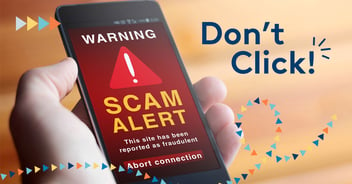
How to Spot a Financial Scam
Your money is hard-earned and deserves protection—but unfortunately there are people out there can be desperate to get their hands on it. Financial scams can take many forms these days—from phone calls to phishing emails—but there are plenty of common calling cards to be on the lookout for to keep you and your funds safe from fraud.
Here are just a handful of ways to spot a financial scam.
Phishing
One of the most rampant forms of fraudulent, especially in the last 10 years, is phishing, where a scammer will pass itself off as a person or business entity you may trust or recognize in order to convince you to offer up personal information about yourself. Often via email, the scam may involve mimicking the look and feel of a business’s website, logo or email style to confuse the recipient. The best way to spot this form of scam is to check the sender and the body of the email to look for typos or irregularities in spelling or web addresses. Whenever an entity, such as a bank or credit union, asks for passwords, credit card numbers or other financial information via an email, there’s a good chance it’s a phishing attempt.
Spoofing
Another way in which a scammer might attempt to gain your trust is by taking on the name of a generic or known business or institution you might already have familiarity with. For example, a caller might pop up on your caller ID as a bank or a government office that you’re inclined to talk to openly—or maybe even a local business name that exists and you’ve patronized. Spoofing entails using the identity of a trustworthy business name to convince consumers to give personal, identifiable information over the phone. Again, no valid business or institution will ask for personal info over a phone call—one way to check the validity is to request to hang up and call them back, subsequently looking up the supposed entity’s phone number and doing the calling yourself. This way you know you’re talking to the true business in question.
Fake Financial Relief
Another form of scam you might see specifically when it comes to managing your finances is unsolicited offers for assistance on making loan payments. Fraudulent loan modification offers might include attempts via direct mail, phone calls or emails to revise the terms of a mortgage or other borrowed funds to help you manage a payment more effectively. Rest assured, if you’re struggling to make your payments, the first line of defense is to proactively reach out to a local credit union such as Levo to get some guidance on your best possible options. Unsolicited offers from unknown entities you can’t confirm exist via a quick Google search are rarely worth pursuing.
Contact our team to learn more about how we protect your account from fraudulent access and more ways that you can implement security measures to keep it that way in the future.

 605-334-2471
605-334-2471


